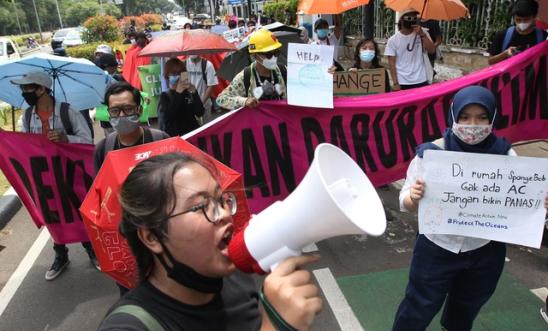
Press releases
G20: Leaders must call on Indonesian government to respect freedom of protest

Global summit taking place amid increasing clampdown on freedoms in Indonesia
At least 834 people were victims of physical and digital attacks by state and non-state actors between January 2019 and May 2022
‘Indonesian authorities must refrain from targeting or allowing any form of crackdown against peaceful criticism, including those directed at the G20’ - Usman Hamid
G20 leaders should use this year’s summit to uphold the rights to freedom of expression, association and peaceful assembly, which have been under attack in Indonesia - the summit’s host country - and around the world, Amnesty International said today.
Member countries must facilitate the right to freedom of peaceful assembly by ensuring people can protest during the 15-16 November summit in Bali, and to put pressure on the Indonesian government to end ongoing repression of civil liberties.
Usman Hamid, Amnesty International Indonesia’s Executive Director, said:
“G20 leaders must call on the Indonesian government to fulfil its obligations to respect and protect the rights to freedom of expression, peaceful assembly and ensure a safe and enabling environment for civil society to defend and promote human rights without fear of reprisals.
“Indonesian authorities must also refrain from targeting or allowing any form of crackdown against peaceful criticism, including those directed at the G20. Security measures around the summit should not become a pretext to further shrink the civic space.
“These acts of intimidation against peaceful activists are impermissible attempts by the country to silence opinions, that are sadly becoming more common in Indonesia.
“G20 member countries must ensure access for civil society to peacefully express their human rights concerns that should be seriously addressed by governments.
“Indonesian authorities must also take effective steps to ensure that all attacks, acts of intimidation and threats against members of civil society are investigated promptly, thoroughly, impartially, independently and transparently to end impunity.”
Ongoing assault on civil society
The annual meeting of the world’s 20 biggest economies is taking place amid ongoing suppression of peaceful dissenters and critical voices in the country, with incidents occurring in the lead-up to the summit.
In early November, Greenpeace Indonesia’s activists were subjected to acts of intimidation and threats during a cycling trip to Bali for a climate crisis campaign ahead of the G20. Security personnel heavily monitored the activists’ movement and activities. Security personnel also forced Greenpeace to sign a statement saying they would stop their activities and campaign during the G20 meeting, according to information obtained by Amnesty.
Over the weekend (12 Nov), local authorities in Bali dispersed an internal meeting held by members of the Indonesian Legal Aid Institute in a villa in Sanur, Bali, citing a provincial policy that limits public events during the G20 Summit. Police attempted to check their phones and laptops after entering the villa without a warrant. Local security guards blocked some staff from leaving the villa compound and others were followed.
Indonesia’s repressive record
In a recent report on civil liberties in the country, Amnesty documented how over the last three years space for civil society has shrunk as a result of an ongoing assault on the rights to freedom of expression, peaceful assembly, association, security of person, and freedom from arbitrary detention.
Between January 2019 and May 2022, Amnesty recorded that at least 834 people, including activists and human rights defenders, were victim to physical and digital attacks by state and non-state actors in Indonesia – none of whom have been held accountable.
Broad provisions restricting freedom of expression under the country’s Electronic Information and Transactions Law have increasingly been misused to criminalise government critics and those expressing opinions in social media. Amnesty recorded at least 316 instances of the law being misused between January 2019 and May this year, and at least 332 victims.